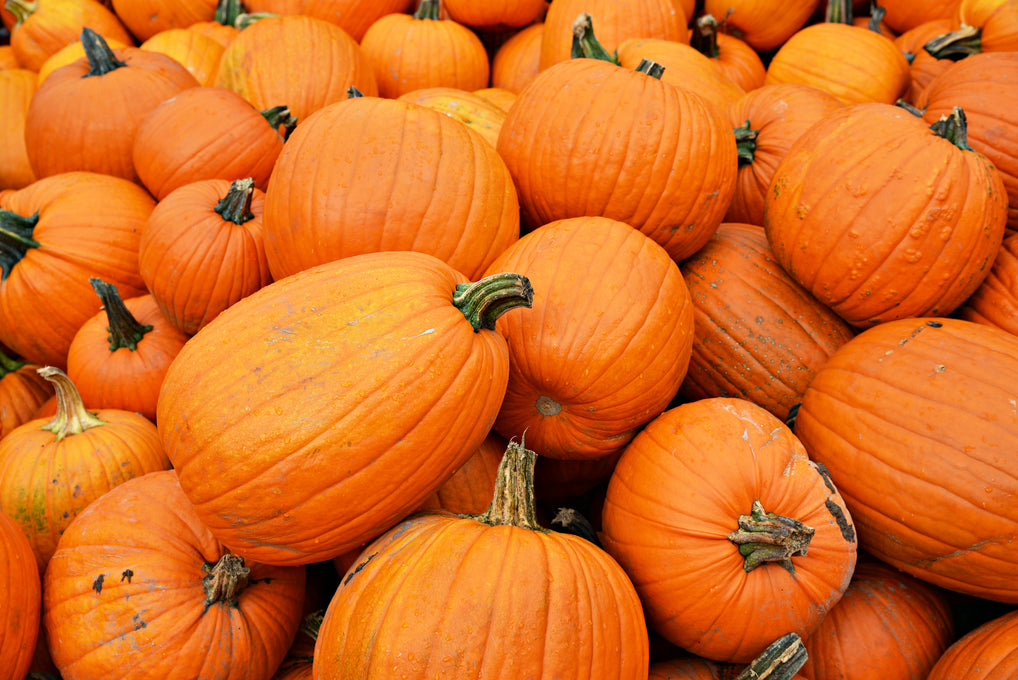The Nutritional Benefits of Pumpkin
26th October 2018 / Health
The Nutritional Benefits of Pumpkin
Zoe Milkowski

The end of October is fast-approaching and we all know that means it’s nearly time for the annual pumpkin carving and vampire fang-wearing holiday; Halloween. With over 16 million pumpkins being bought and carved for Halloween each year in the UK alone we really ought to know a little bit more about the spooky squash.
Hooray for vitamin A
Although commonly mistaken for (and with a similar nutritional profile to) vegetables, pumpkins are actually a type of fruit as they contain seeds and pulp encased within a thick, often orange, shell. The orange colour of this shell is the first clue to the nutrient-dense powers that pumpkins posses. The thick orange shell gets its colour from the orange carotenoid pigments that it contains. Alpha and beta carotene are two of the more commonly known pigments, which are naturally converted into vitamin A in the body. Pumpkins are an amazing source of these fat-soluble compounds – in fact, 100g of pumpkin contains around 170% of an adult’s daily recommended vitamin A intake. Vitamin A compounds are vital for maintaining a healthy immune system, ensuring the normal function of many organs. We can all stand to benefit from a boosted immune system – especially in these colder winter months.
Packed with vitamin C
Not only does pumpkin contain high amounts of vitamin A, it also packs in a good amount of vitamin C and potassium. 100g of the orange stuff can provide up to 15% of your recommended vitamin C intake – a vitamin very well known for its immune-boosting function. Vitamin C has been found to increase white blood cell production, making the immune system better equipped to fight off infections.
Antioxidant power!
Alpha and beta-carotene, as well as some of the other compounds found in pumpkins are also both well-established antioxidants. Antioxidants are substances that can prevent oxidative stress – one of the causes of numerous chronic illnesses such as heart disease and high blood pressure. Antioxidants have even been proven to help slow the process of ageing. We are by no means suggesting that eating a spoon of pumpkin puree every day will turn back the clock, but there are definitely benefits to be had in incorporating pumpkin into your diet.
Weight-loss friendly
Despite being nutrient-rich, pumpkins are extremely low calorie. Per 100g of cooked pumpkin, there are only about 26 calories which is, in part, due to them being made up of over 90% water. As well as also being a very good source of fibre (which means you’ll be kept feeling fuller for longer), pumpkin is a very tasty, extremely versatile and weight-loss friendly food – it can be eaten in larger volumes than other carbs like rice and potatoes while still delivering fewer calories.
All in all, pumpkin seems to be a very underrated and nutritionally robust food that can be used in a variety of dishes. One way of using up your leftover pumpkin pulp from Halloween could be by trying this deliciously indulgent chocolate pumpkin protein shake. Don’t knock it till you’ve tried it…
Serves: 1
INGREDIENTS:
- 200ml milk of your choice (we used almond milk)
- 1 scoop of our chocolate fudge vegan protein powder
- 170g cooked pumpkin pulp
- 2 Tbsp coconut oil
- ½ a banana
- Dash of pumpkin pie spice
Optional extras: flaxseed for added protein and thickness
METHOD:
- Blend everything together until smooth.
- Transfer to a glass
- Enjoy!
From The Blog
-

25th February 2025 / Health
Empowering Women’s Health: Key Supplements for Well-being
Women’s health is a lifelong journey, with each stage presenting unique nutritional and wellness needs. From maintaining energy levels to supporting hormonal balance and bone health, the right comb...
Read article -

17th February 2025 / Health
Empowering Women’s Health: Lifestyle Tips and a Key Supplement for Perimenopause and Menopause
NaomiWomen’s health evolves through various life stages, and the transition into perimenopause and menopause brings unique challenges. During these phases, hormonal fluctuations can lead to symptom...
Read article -

10th February 2025 / Health / Products
The Best Foods and Drinks to Help Your Body Recover from Burnout
Burnout is a growing issue in today’s fast-paced work culture, leaving many people feeling exhausted, overwhelmed, and depleted. While rest and self-care are essential, nutrition plays a crucial ro...
Read article




